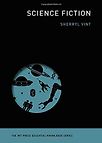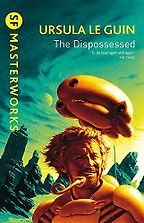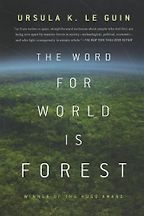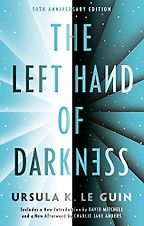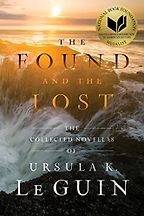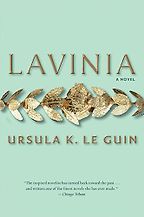Who was Ursula K. Le Guin and why have her books become so influential within science fiction and fantasy?
Ursula Le Guin is a writer who became prominent during the 1960s and 1970s. A number of her works were groundbreaking, especially in terms of their treatment of gender—which is probably what she’s best known for. She was in dialogue with other feminist writers of the time. In a sense, I’d also argue that her works were groundbreaking for the field in terms of her treatment of colonialism.
I think—unfortunately, in my view—that a lot of people share an understanding of science fiction that is based on a limited number of writers from the 1940s and 1950s, which was all about space adventure, space battles, colonising planets, and things like that. But there is a tradition of writers who have, for decades now, been using the genre to think about cultural and social issues.
Ursula Le Guin was also one of the first writers to be thinking about other species and our relationship to ecology. So a lot of things that are really prominent today, in a more diverse genre, were part of her work decades ago. Writers from many countries are now participating in science fiction, and there are strong traditions of decolonising, feminist and queer science fiction. Le Guin was one of the people who opened the genre to contemplating these kinds of perspectives.
A lot of what you said there reminded me of why I’ve enjoyed doing science fiction interviews for Five Books; it’s made me look afresh at the genre. I’ve begun to think of it as not so much a mode of entertainment but as a genre with explicit allegorical or analytical aims. With that in mind, maybe this is a good point to talk about your new book, Science Fiction, in the MIT Press Essential Knowledge series.
It’s quite a short book. It’s meant to be accessible to people who don’t necessarily know anything about the genre, to introduce them to the scope of the conversations going on in the field today. Ideally, I hope there’s something for people familiar with the genre too. The book is really about science fiction as a way of thinking, a genre that’s doing something in the world, rather than just a set of icons: robots, spaceships or aliens, etcetera. It’s thinking through how science and technology intersect with human social, cultural and political relationships.
The chapters are organised around questions where those connections are particularly prominent and necessary today; things like decolonisation, climate change, environmentalism, robotics and automation, synthetic biology and the microbiome… What do they really mean for our understanding of ourselves, our world, our political systems and our ethics? That’s the work science fiction is doing, thinking things through in those spaces.
I think this is a good way to think about Ursula Le Guin, specifically, too. Because she deals with many of those issues in her writing. Shall we talk about The Dispossessed first? It was published in 1974, and tells the story of an exiled scientist from an anarchist world arriving on an ultra-capitalist planet.
The Dispossessed is an important work for a number of reasons in terms of Le Guin’s ‘Hainish Cycle.’
Right, yes. Perhaps before we go further, you should tell us about the Hainish Cycle.
The Hainish Cycle is a series of interlinked novels. The Dispossessed is one, The Word for World is Forest is one, The Left Hand of Darkness is one. There are other stories and novels. She imagines that, because of the ‘ansible’—which is invented in The Dispossessed—there can be instantaneous communication across vast interstellar distances. So all the different societies are able to be part of this league of worlds, and have trade and political relationships with each other.
Part of the vision of the Hainish Cycle is that at some point, all of these planets were originally colonised by the Hainish in their distant past. So they have a kinship relationship across all these planets too.
I would argue that she uses the Hainish Cycle to explore the diversity of how it’s possible to be human—both morphologically, because we have a non-gendered version on Gethen in The Left Hand of Darkness, and the smaller, furred creatures in The Word for World is Forest—but also in terms of culture.
There are different ways of drawing lines between who you are going to recognise as human, and even in the novels where it is known that they all have the kinship relationship, there are characters that refuse to acknowledge that, and claim that clearly their species is superior. So the difficulty of humans acknowledging kinship across cultural and morphological difference is something she explores with a lot of depth and sophistication across all these books.
You feel that The Dispossessed is one of the key texts of Le Guin’s oeuvre.
Yes. As I said, this is the novel in which the ansible is invented, the technology of instantaneous communication across huge distances. So it is a way to make cultural understandings at the centre of what it means for different civilisations to be in contact with each other. So that’s one of the reasons.
I also think it’s a really important novel because, as its subtitle suggests, it has an ambiguous relationship to the notion of utopia. Both the anarchist society and the super capitalist society have their pros and cons, right? I think, ultimately, she’s more on the side of the anarchist society, or certainly I’m more on the side of the anarchist society, and that comes out in how I read the novel. But she does represent each as having ongoing problems that need to be worked through.
What’s really interesting about how she treats that dichotomy is how she complicates it, makes it more than a binary. The anarchists have to deal with conditions of scarcity—that makes it a lot harder to have an egalitarian civilisation if there’s never enough for everyone. Nonetheless, they persist because of their commitment to their values. Whereas the capitalist society has a super-abundance, yet it has as much deprivation as the society based in scarcity; inequality is the biggest problem in the capitalist society. So I think that contrast asks us to think carefully about the assumptions we make about the relationship between human nature and the kinds of political systems that we’re likely to build.
“The way we maintain a utopia is by cutting ourselves off from the outside”
I think it’s an important novel for today because we’re at this moment of increased, polarised anxiety about migration, about how it is that people from really different cultural traditions can live with one another. And I think this novel is foregrounding the problems that we have to work through to reach an inclusive and equitable state rather than just positing some kind of magical, perfect society where everybody’s already solved these problems, and usually because somehow the issue of scarcity has disappeared.
The book makes clear references to Thomas More’s Utopia. Le Guin’s anarchist planet Anarres shares many aspects: there are no locks on the doors, no private property. There is a rotation of accommodation. More’s Utopia was quite ambiguous too.
Very much. Another thing that’s true of Thomas More’s Utopia is that it’s isolated. The way we maintain a utopia is by cutting ourselves off from the outside. Walls are a symbol throughout Le Guin’s novel, especially the wall around the space port.
Yes, it’s the only border on the whole planet, and it’s described in the opening scene: “Like all walls it was ambiguous, two-faced. What was inside it and what was outside it depend upon which side of it you were on.”
Shevek’s going to the other planet breaks that isolation. I think that, combined with this being the novel in which the ansible is invented, really does suggest that one needs to be in cultural exchange, I think.
This emphasis on questioning utopia as a model of perfection is not an idea that’s original to me. This comes from Tom Moylan’s work, which gave us a new and more complicated vocabulary for thinking about the utopian tradition in science fiction. Le Guin is one of the writers he talks about as what he called ‘the critical utopia,’ a utopia that still has its problems as this one clearly does. What you actually learn is that utopianism is not the model of how the society should work, but rather a commitment to the values a society should uphold, even though you are always in progress in trying to manifest this in a concrete way. But it’s what Le Guin refers to in this novel as ‘permanent revolution.’ That what is utopian is always asking questions, never letting society sediment into these rigid roles.
Precisely what goes wrong with the anarchists is that the bureaucracy they need to manage distribution and scarcity solidifies into a power structure, and then they’re not as anarchist anymore, as their ideals would have it. The sense is that utopia is never a place you arrive at, but it’s a journey you’re on.
Yes, that makes sense. And feels right, given the fraught history of attempts at building utopian communities—we’ve talked before on this site about how so often they start well, but later fail. Thinking of utopia as a process, not a destination, makes sense. Let’s move on to our next Ursula Le Guin book: The Word for World is Forest. What is it about, and why do you feel it to be one of her best books?
It’s set on a planet that has been colonised by Terrans—people from Earth, in the interspecies Hainish Cycle—but there are indigenous people on this planet, who are humanoid but look distinctly different. They are furred, they’re much shorter in stature, and their pigmentation is green. The colonists regard them as subhuman and they’re enslaved: forced into labour camps to participate in a forestry project. That’s why the humans are there: to harvest the forests and take them back to Earth.
The indigenous civilisation has a culture in which they never kill one another. Initially the indigenous people extend that to the colonisers as well, whereas the colonisers use all kinds of horrific violence to force the indigenous to labour. This novella was first published in 1972, and it seems very clear that it relates to America’s occupation of Vietnam at that time because, in addition to deforesting the planet, one of the things they use to attack the indigenous people is called ‘burning jelly.’ So that’s directly evoking the imperialism of the US Army of the time.
Five Books interviews are expensive to produce. If you're enjoying this interview, please support us by donating a small amount.
There’s an uprising among the indigenous people, and eventually they force the colonists to leave. But at the end there’s an, again, ambiguous—I think Le Guin is very good at ambiguity—ending. The indigenous people have been successful in forcing the colonists to leave and stop killing their forests. But they’ve also changed their culture as a result of this contact. The possibility that humans (that is, the local people) can kill one another now exists within their culture, and we’re left wondering what that means for their future.
I’ve seen this book described as a polemic. Do you think that’s fair?
Is it a polemic? I don’t know if I would say that. What I would say is that it’s sort of vocalised through two characters. One is an indigenous character and the other is the most militant and aggressive of the human characters, who continues with a sort of retribution against the indigenous people even after he’s ordered to stop by his command structure.
His voice is very much a caricature. It’s a very one-dimensional character, who’s continually fantasising about violence against women, violence against the natives… he’s obsessed with his own notion of masculinity. So I think he’s not a well-developed character, and the choice to give voice to the point of view of the colonisers was not particularly successful. But I don’t know if it’s a polemic in that I don’t think it is controversial. But then, I’m very sympathetic to the decolonising point of view.
One thing I want to mention here is Le Guin’s family history: her father was an anthropologist who famously worked with Ishi, the last of the Yahi people who were indigenous to Southern California. I guess we can see where some of the inspiration, and also the anger, might have come from.
Absolutely. That’s a very important aspect of Le Guin’s approach to science fiction. In this novel in particular, one of the things about her representation of the indigenous people is that they get new knowledge through dreaming. For them, dreaming is a serious ontological and epistemological practice; dreaming and material space are deeply related. This is something that’s consistent with a lot of North American indigenous beliefs, so she’s drawing on that.
I know that some people will have concerns that she’s not indigenous, yet she’s drawing on indigenous tradition, and I have mixed feelings about that myself. I think we now have much greater consciousness of citational practices—that one needs to credit the indigenous thinkers who are the holders and developers of these ideas. In terms of that moment in the 1970s when she published this, though, I still want to give her some credit for bringing that worldview into the sort-of mainstream, in a way that takes it very seriously.
“She’s very sensitive to the notion that our ideologies and values are embedded in the language we use”
Even the title: The Word for World is Forest. In the indigenous point of view, you don’t regard trees as resources. You can’t cut down all the trees and still have a world. It’s a much more ecologically minded way of living with other species. Not overharvesting, not destroying. A lot of reasons that people turn to indigenous thought now is that we’re in an environmental crisis produced by extractive capitalism. People are suddenly thinking that maybe indigenous people had some better ideas about how to live with and sustain the ecologies around them.
That’s very much part of the worldview and language she imagines for the indigenous people in this novel. That’s very typical of Le Guin overall, too. Like in The Dispossessed, there are huge language differences. She invents a new language for the anarchist society, basically, because she’s very sensitive to the notion that our ideologies and values are embedded in the language and metaphors we use.
I think you can see an anthropologist’s eye in all Le Guin’s work. Her books are essentially studies of foreign cultures. But maybe that’s most true of our next book, which is The Left Hand of Darkness. I sometimes say this too readily of books, but this one genuinely blew my mind the first time I read it.
Le Guin introduced the notion of what some people would call ‘social science fiction.’ I’m not sure I entirely embrace that term, because the social and the scientific are always working together. But because there is this older tradition of science fiction being all about physics, space travel and stuff, there were attempts to imagine technological change without social change, and social science fiction refuses that worldview. Indeed, sometimes there are not even any technological changes but just social changes that mark the world as different.
But let’s get back to the novel. In one of the introductions that it has been published with, she specifically describes it as a thought experiment. It’s a simple idea: what if there was no gender? What if people were neutral in their gender, and only took on gender characteristics for sexual reproduction? If anybody could take on either masculine or feminine characteristics, and if throughout your lifetime you might be both, then what would it mean? We have a world thoroughly saturated with gender difference and patriarchal worldviews, and Le Guin makes us realize how true this is by the contrast.
Again, much like we were talking about with The Dispossessed, this doesn’t mean we get a magical utopia where everybody gets along. There are no gender hierarchies, but the power games are different. In fact, one of the things that was most exciting for me about this novel when I first read it is how Genly—
This is the main character, a diplomat sent to make contact with this genderless world.
—yes, how much he gets wrong, because he can’t help but see the world through the assumptions of a gendered culture. So he makes mistakes: he genders people, even when their understanding of themselves is not gendered. Because of his sense of who is female and who is masculine, he trusts the wrong people. He misunderstands the power games that are going on. So it’s an extended experiment in how thoroughly cultural assumptions shape our ability to even perceive the world.
To me, that’s the most exciting part of the novel. I know other people are interested in the relationship of trust that develops between two characters across different cultures; there’s also that really strong interpersonal dimension to the novel.
Absolutely. There’s an incredible interlude while these two characters are trekking through an icy waste, which is almost a book-within-a-book. Let me quote from Le Guin, tackling this idea of thought experiments explicitly: “‘Why are things as they are? Must they be as they are? What might they be like if they were otherwise? To ask these questions is to admit the contingency of reality, or at least to allow that our perception of reality may be incomplete, our interpretation of it arbitrary or mistaken.” This seems to me the philosophy underlying all her writing.
To a degree. She was also very influenced by Taoism, notions of balance, and perceiving difference dialectically rather than as a binary, so yes it can be arbitrary or mistaken, but that doesn’t mean that there is an opposite to that which we could call correct. That’s something that comes out strongly in her philosophy. The quotation you just read reminds me of one of my own favourite things she said. This was when she got the National Book Foundation Medal for Distinguished Contributions to American Letters in 2014; in her speech she not only thanked the committee for giving her the award, but said it was high time that speculative fiction writers were recognised as participants in the culture of literature, instead of being sort of segregated to a ghetto—she called them “realists of a larger reality.” And she reminded everyone how important science fiction is because the genre is about “writers who can see alternatives to how we live now.”
I like that.
I strongly agree with her and I hope this comes through in the work that I do. Science fiction is such a necessary genre today, because in many ways we do have to remember how to think otherwise in the dystopian world we are living in: a world of ever-present racism, ever-growing economic inequality, and returning ethno-nationalism, a world where Covid-19 has shown us how vast the gaps between the privileged and non-privileged are. This is not just the way things are, unchangeable.
She said: “We live in capitalism, its power seems inescapable—so did the divine right of kings.” We no longer live in that world. So that capacity to imagine things otherwise is so important, politically.
Your fourth Ursula Le Guin book recommendation, Paradises Lost, is a novella first published in 2002, so one of her later works, and it can be found in a 2017 collection of her novellas, The Found and the Lost. This is a standalone work—that is, not part of the Hainish Cycle.
Yes. It’s about a multi-generational space journey from Earth. Unlike some similar visions, they don’t have cryo-sleep or anything like that, the generations are lived through the trip, which is a sort of utopian dream—going from an Earth that is no longer serving their vision of what the good life is, to another planet.
There are a couple of reasons why I wanted to add it to the list. Unlike most of the works I chose, this is not a well-known story. I wanted to add something new into the mix. And also we have so many fantasies these days—mainstream fantasies—about colonising Mars. People say things like, ‘it’s about the future survival of the human race,’ which seems ludicrous to me. We can barely survive on the planet we’ve evolved on, how can we imagine we can terraform a planet that’s not able to sustain us? But that fantasy of escape from Earth is alive and well today.
“They arrive like a different species of human to the humans that could live on this planet”
So, Paradises Lost. The pluralisation is important. Each generation has different ideas about paradise. The zero generation had a vision, and they wrote the constitution for the ship: this is what we’re going to do, and it will take 200 years to get there. The middle generations are just supposed to keep everyone alive so that by the time they get there, there will be colonists. And of course the colonists are supposed to continue that vision.
But though 200 years, for a multi-generational ship, is not that long, if you think politically that’s a very long time. Think of America at its bicentennial: how close was it to following what the founding fathers set out? How much has changed in the last 200 years? Cultural changes and different values arise.
Mission drift. Every generation redefines itself.
As with The Dispossessed, this novel shows that you can’t fix a political policy in time. Even in a small space—4000 individuals, over 200 years—different political ideas arrive. And they start to imagine the ship itself as their world. So when they finally do arrive at the supposed paradise, this new green planet, they are looking for electrical outlets.
They’re used to not wearing shoes, and find the ground uncomfortable. They haven’t brought any species other than plants with them, and the microbes needed for the soil, so they have no living memory of animals. So any other creatures around freak them out.
So they arrive like a different species of human to the humans that could live on this planet. I think that deep materiality of her vision brings us back down to Earth, if you will, from these fantasies about colonising Mars.
You mentioned that multigenerational voyages are a kind of trope within science fiction. Did Le Guin do that a lot—play with the conventions of the genre?
Not usually so directly. Obviously the multigenerational space ship is something you might recognise. There’s The Word for World is Forest—a lot of earlier science fiction is about either terraforming or resource extraction from a planet, but very seldom do you see sentient indigenous people resisting that effort. Or if you do, it becomes a space battle war with no sympathy for the original inhabitants. It doesn’t have that same critique of colonialism perspective.
She also wrote fantasy. I’ve read a lot less of her fantasy, because I’m mainly a science fiction person. But my understanding, from what I’ve read of her fantasy, is that she also remixed fantasy tropes, and perhaps more overtly.
In her science fiction work, she’s more charting new territory. Think of The Left Hand of Darkness: on one level, it’s a story about a cultural emissary going to meet a new civilisation. We could call that a science fiction trope, sure. But what’s more important is what she’s doing with gender, rather than the stuff around visiting a new culture. It’s a reinvention of what the genre can do, more than playing with tropes.
Speaking of fantasy, we should mention her Earthsea cycle, which is greatly beloved. And she wrote non-speculative fiction as well. For your fifth recommendation, you’ve chosen one of these books: Lavinia, a narrative based on the last six books of Virgil’s Aeneid.
She did write a lot of non-speculative work, including books for children. She just made a huge contribution to literature overall. One of the reasons I wanted to include this book in the list, beyond expanding beyond the books everyone recognises and talks about, is that I think there’s an interesting relationship between historical fiction and speculative fiction.
They are both interested in how culture changes with time, and the kind of moments that orient a culture to take a new path. These moments accumulate—as we spoke about with Paradises Lost, and how the humans that arrive are a different kind of human to those that left Earth. Those kinds of changes.
Get the weekly Five Books newsletter
With the case of Lavinia, she does careful research about the lives of people in what we now call Italy, when the events of the Aeneid were meant to have taken place. They have different gods, different ways of thinking about violence, different ways of thinking about gender. It’s an alien culture, if you will. That’s one thing that historical fiction explores through careful research, and science fiction is also really interested in—the diversity of what’s possible for human cultures and values.
Nicola Griffith, another science fiction writer I really, really love, also wrote a historical novel, Hild, which does similar things to what Le Guin is doing in Lavinia. Here Le Guin is also giving voice to a character who’s not really given voice in the patriarchal literary tradition.
And Atwood, I guess, in The Penelopiad.
I think this is consistent with what Le Guin does in her speculative fiction. She writes about how the indigenous regard cultural colonisation, or how people who aren’t invested in gender understand politics. Things like that. She’s also interested in the role that legends have in shaping behaviour. Because even though I’m calling it historical fiction, there’s a metafictional quality to this, because Lavinia has conversations with Virgil, and in some way understands herself to be a sort of textual figure of Virgil’s invention. It’s clear that Virgil’s not writing history. He’s inventing this grand mythos for the founding of Rome that probably has nothing to do with the actual founding of Rome—but yet becomes so important to subsequent understandings of Roman identity, the Roman empire, and so on.
It’s a book that really shows the power of stories. And, ultimately, that’s what Le Guin has explored throughout her career—the power of stories in shaping cultural values and political societies.
As you mentioned, she was extremely prolific. She wrote 22 novels, 11 volumes of short stories, four collections of essays, 12 books for children, six volumes of poetry and four of translation. It’s an incredible output. But let’s return to this point about her interweaving of fiction and a sort of straight-speaking philosophy. I think we have to perceive Ursula Le Guin as a great American writer, but also a great thinker more generally. Would you agree with that?
Absolutely. Indeed, that’s part of my understanding of what science fiction, as a genre, does, and why I want to work in it. It’s a place for thinking through what happens when different cultures meet, for thinking through how technology changes social and political life. We’re thinking through whether the things we take to be necessary are actually contingent after all, and where we can go from there.
Interview by Cal Flyn, Deputy Editor
May 7, 2021. Updated: February 27, 2025
Five Books aims to keep its book recommendations and interviews up to date. If you are the interviewee and would like to update your choice of books (or even just what you say about them) please email us at [email protected]

